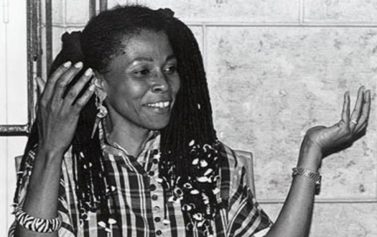Despite the flood of New Jersey officials loudly seeking the extradition of Assata Shakur from Cuba—including NJ Gov. Chris Christie—now that the U.S. and Cuba have normalized relations, a high-ranking Cuban official indicated yesterday that Cuba has no interest in returning Shakur to the U.S. to finish out a prison sentence after her conviction for killing a New Jersey state trooper, a crime Shakur has long denied.
When Josefina Vidal, Cuba’s head of North American affairs, was asked by the Associated Press if the issue of Cuba returning fugitives to the U.S. was open to negotiation, she stressed Cuba’s right to grant political asylum.
“Every nation has sovereign and legitimate rights to grant political asylum to people it considers to have been persecuted … That’s a legitimate right,” she said. “We’ve explained to the U.S. government in the past that there are some people living in Cuba to whom Cuba has legitimately granted political asylum.”
While she didn’t mention Shakur by name, Vidal added, “There’s no extradition treaty in effect between Cuba and the U.S.”
Christie, who is reportedly considering a run for president, forcefully put the return of Shakur on the desk of President Obama in a letter to the White House Friday and made public Sunday.
Christie said Cuba’s granting of asylum for Shakur was “an affront to every resident of our state, our country, and in particular, the men and women of the New Jersey State Police, who have tirelessly tried to bring this killer back to justice.”
By pressuring the White House, Christie presents Obama with a compelling dilemma—does he risk alienating the African-American community, where many people consider Shakur a hero, by pushing Cuba to send her back to an American jail? Or does he upset the law enforcement community by remaining silent on the matter?
In a CBS News report, there was a noncommittal statement from Bernadette Meehan, a spokeswoman for the White House’s National Security Council. She said the White House will “continue to press in our engagement with the Cuban government for the return of U.S. fugitives in Cuba to pursue justice for the victims of their crimes.”
CBS reported that in addition to Shakur there are other infamous convicts and suspects in high-profile American cases living openly in Cuba, including a man sought for a 31-year-old armed robbery, airplane hijackers, and dozens accused of Medicare and insurance fraud.
Though Cuba occasionally returns people convicted or suspected of committing crimes in the U.S., the State Department has said Cuba doesn’t observe traditional extradition and refuses to send anyone back for a crime Cuba considers political in nature.
Vidal pointed out that extradition would need to go both ways.
“We’ve reminded the U.S. government that in its country they’ve given shelter to dozens and dozens of Cuban citizens,” Vidal said. “Some of them accused of horrible crimes, some accused of terrorism, murder and kidnapping and in every case the U.S. government has decided to welcome them.”
The Queens-born Shakur, the step-aunt of rapper Tupac Shakur (her brother was Tupac’s stepfather), for decades has been a despised figure in law enforcement circles, where she is seen as a dangerous cop-killer and terrorist. But to many Blacks, Shakur is a hero for standing up to law enforcement while she was a leader of the Black Liberation Army in the 1970s and for her forceful writings and commentary on the conditions of Black people after she fled to Cuba around 1984.
She has been the subject of films, documentaries and rap songs over the years, in addition to her own writings, which were influential to a generation of activists.
After her conviction for killing New Jersey State Trooper Werner Foerster during a shootout on the New Jersey Turnpike in 1973, Shakur became an underground legend in 1979 after she made a daring escape from prison—with the help of accomplices who took two guards hostage—and fled to Cuba, where she has been living in exile the last 30 years. The FBI and the New Jersey State Police last year raised the reward for her capture to $2 million and put the 67-year-old fugitive on its Most Wanted Terrorist list—the first woman to make the list of top terrorists.
After she was convicted of Foerster’s murder, carrying a mandatory life sentence, Shakur said the jury was “racist” and had “convicted a woman with her hands up”—an eerie connection to the Michael Brown killing by a Ferguson police officer.
“This case constitutes an open wound in our organization, and open wound in the Forester and the Harper families, and we have tried to take advantage of every opportunity,” Col. Rick Fuentes, head of the New Jersey state troopers, said last week in calling for Shakur’s return.


